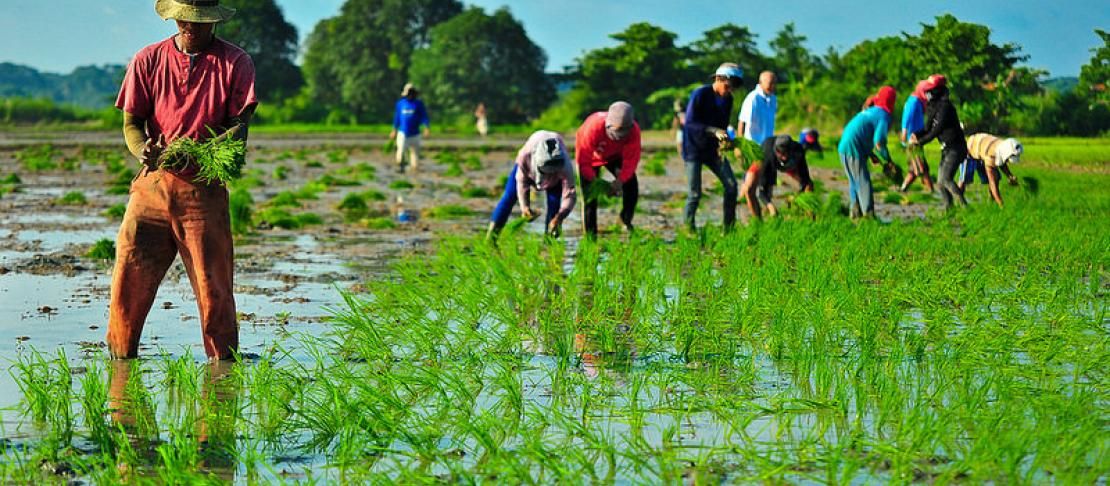'No regret' mitigation strategies in rice production

Project description
'No regret' mitigation strategies in rice production analyzed incentives for scaling up climate change mitigation based on highlighting co-benefits of mitigation options.
The project looked beyond simple water-saving benefits to identify the full range of impacts on smallholder farmers of low-emissions rice production. As such, the project sought to overcome what has traditionally been one of the largest hurdles to widespread uptake of Alternate Wetting and Drying (AWD), an irrigated rice growing practice that significantly decreases methane production while keeping yields consistent: while the water-saving features of AWD are climate-friendly, these water-saving features do not provide enough incentive to motivate adoption for many smallholder farmers. This project addressed the problem of slow uptake of AWD and other mitigation options by providing an innovative methodology for assessing and strengthening research on all of the ancillary benefits of AWD – what is called ‘no-regret’ mitigation.
The ‘No regret’ project accelerated large-scale uptake of AWD by embracing a large range of stakeholders, from farmers and extension services to national policy makers. At the farm level, the project assessed agronomic impacts on crop performance through participatory field-testing in Climate-Smart Villages. Both women and men farmers – while recognizing their different roles and needs – had equal opportunities to be involved in field testing, evaluation of technologies, and training sessions. Training materials were offered in local languages. At the farmer level, the project explored whether participatory mitigation selection (PMS) helped farmers decide on low-emission crop management options that are locally suitable. This also allowed a quantitative evaluation of the co-benefits of mitigation techniques (agronomic and economic).
The project purposely analyzed gender- and socially differentiated knowledge and perceptions toward climate change to increase understanding about how households process decisions about whether to adopt a new technology. Gendered patterns of interaction and gender-disaggregated data on access to information and level of participation were collected and analyzed, then used to adjust training materials and support decision making. By recognizing that perceptions and attitude toward mitigation options vary across gender and social groups, participatory approaches to communicating information were modified to increase understanding in all of the gender and social groups.
The project also supported Vietnam’s National Action Plans (NAPs) and evaluated potential opportunities to scale-up Nationally Appropriate Mitigation Activities (NAMAs). Additionally, the agriculture sector may integrate mitigation objectives into its modernization campaigns and rehabilitation programs, e.g. for irrigation infrastructure. Distinct links to IRRI’s projects Policy Information and Response Platform on Climate Change and Rice in the ASEAN and its member countries (PIRCCA) and the Climate and Clean Air Coalition (CCAC) - funded Rice Paddy Component ensure well-established networks to be taken advantage of in order to reach out to policymakers. The ‘No regret’ project provided policy makers with field-based evidence on yield and emission changes and analyses of benefits to farmers. By strengthening extension services through trainings and workshops, local policymakers now have the information they need to implement mitigation strategies.
Finally, this project also analyzed how synergy may be developed through the adoption of mitigation technologies and modernization.
Outputs
The outputs of the 'No Regrets' project are now informing the "GHG mitigation in rice: From evidence-based concepts to adoption at scale" project beginning in 2019.
- Islam SF, van Groenigen JW, Jensen LS, Sander BO, de Neergaard A. 2018. The effective mitigation of greenhouse gas emissions from rice paddies without compromising yield by early-season drainage. Science of The Total Environment, 612:1329-1339.
- Tariq, A, Duong Vu Q, Jensen LS, de Tourdonnet S, Sander BO, Wassmann R, Van Mai T, de Neergaard A. 2017. Mitigating CH4 and N2O emissions from intensive rice production systems in northern Vietnam: Efficiency of drainage patterns in combination with rice residue incorporation. Agriculture, Ecosystems and Environment 249: 101-111.
- Government of Vietnam. 2016. Handbook on measuring GHG emissions from rice. Includes Vietnam Ministry of Agriculture and Rural Development (MARD) Decision 4831 /QD-BNN-KHCN issued on November 21, 2016 signed on behalf of the Minister by Vice Minister Doanh releasing the guideline for the measurement of GHG emission in rice. In Vietnamese, and published by the Ministry of Agriculture and Rural Development.
- IRRI. GHG mitigation in irrigated rice. Online kiosk of information.
- Butterbach-Bahl K, Sander BO, Pelster D, Díaz-Pinés E. 2016. “Quantifying greenhouse gas emissions from managed and natural soils.” In Rosenstock T et al. eds. Measuring Greenhouse Gas Balances and Evaluating Mitigation Options in Smallholder Agriculture. Springer.
Related information
Gallina A, Farnworth CR. 2016. Gender dynamics in rice-farming households in Vietnam: A literature review. CCAFS Working Paper no. 183. Copenhagen, Denmark: CGIAR Research Program on Climate Change, Agriculture and Food Security (CCAFS).
Further information
For further information, please contact Ole Sander (IRRI) at b.sander@irri.org.